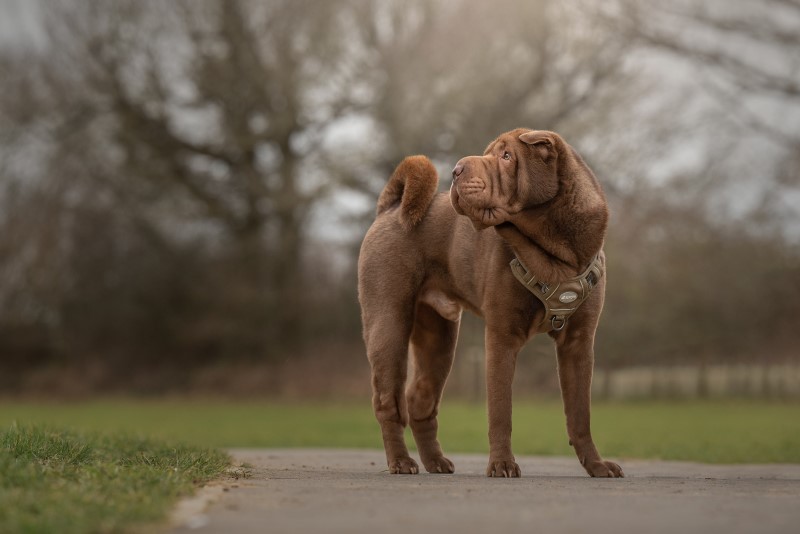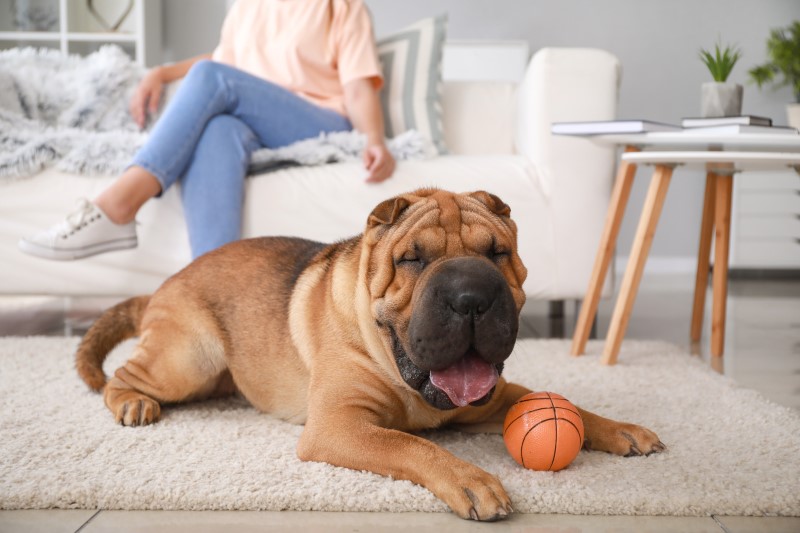New research confirms extreme welfare issues in Shar Pei, the sandpaper skin dog breed
New research from the Royal Veterinary College (RVC) has found that in-turned eyelids and ear disorders are the most common health conditions in Shar Pei dogs in the UK; both resulting from the breed’s characteristic loose, thickened and folded skin. This research highlights that urgent action is needed to discourage the normalisation and high public demand for dogs such as Shar Pei with extreme body shapes that threaten the dog’s welfare.

Shar Pei are an instantly recognisable dog breed for their distinctive loose folded skin and bristly coat, associated with a genetic disorder called hyaluronosis. The name Shar Pei translates from Chinese as ‘sandpaper skin’ that describes the breed’s characteristic harsh coat. However, while their unique appearance is popular with the public, the breed’s extreme appearance has been linked to several health problems, including common and severe eyelid and ear issues.
This new study aimed to provide robust information and a better understanding of the common health and welfare problems in the Shar Pei dog and to suggest changes which could protect the breed in the future.
The study was led by the RVC’s VetCompass Programme. It investigated the health of 1,913 Shar Pei dogs, using anonymised primary-care veterinary clinical records to explore data on the demography, common disorders and mortality of the breed in the UK in 2013.
Shar Pei were identified as quite popular in the UK, comprising 0.42% of the study population of 455,557 dogs. However, the study did identify that the popularity of the breed had been dropping over time, possibly because of growing awareness of their health issues. Around 36,000 Shar Pei dogs are currently estimated to be owned in the UK, highlighting the substantial scale of the welfare issues linked to the health concerns reported in the current study.
The study identified that in-turned eyelids (entropion) was the most common disorder diagnosed in Shar Pei dogs by vets, with almost one in every five dogs (17.9 percent) formally diagnosed with the condition every year. This is far higher than the one in 200 non-Shar Pei dogs that are diagnosed with entropion each year2. In-turned eyelids is an extreme conformation caused in the Shar Pei by the loose folded skin around the eyes that results in the eyelashes and hair around the eye rasping across the sensitive front of the eye every time the dog blinks, causing severe pain and eye ulcers.
The second most common disorder identified in Shar Pei was ear infections (otitis externa), caused by the narrowing of the ear canal due to the thickened and folded skin. Among Shar Pei, 16.4 percent were diagnosed with an ear infection each year, whereas the risk was less than half (7.3 per cent) for dogs that were not Shar Pei2.
Other common conditions identified in Shar Pei included ear disorders (6.7 percent); high levels of aggression (5.2 percent) which was more than double the levels found in non-Shar Pei dogs2 (2.2 percent); skin infections (4.3 percent); and conjunctivitis (4.0 percent).

Additional key findings include:
- Shar Pei fever, an inherited auto-inflammatory disease that is specific to Shar Pei due to the genetic mutation that defines the breed, was the ninth most diagnosed disorder, with 3.0 percent of all dogs diagnosed each year.
- Among the most common disorders in Shar Pei dogs, females had a higher probability of in-turned eyelids, and conjunctivitis, whilst males had a higher probability of aggression and pododermatitis (infected paw).
- The average adult body weight for Shar Pei dogs was 22.3kg. The average body weight of males (23.5kg) was heavier than for females (20.8kg).
- The most common causes of death were cancer (15.4 percent), kidney disease (13.2 percent) and undesirable behaviour (11.0 percent).
The research highlights that urgent action is required to reduce the public demand for dogs such as Shar Pei that have extreme body shapes. To reduce welfare impacts for future Shar Pei, these dogs need to be bred with thinner flattened skin that is no longer loose from their bodies.
Dr Dan O’Neill, Associate Professor in Companion Animal Epidemiology at the RVC and lead author of the paper, said:
“Animal welfare legislation in England and Wales places a legal responsibility on owners to prevent unnecessary suffering in their dog. This new evidence from the Royal Veterinary College clearly shows that the extreme conformation of loose thickened and folded skin leads to painful in-turned eyelids and several other serious health issues. It is now time for us all to unite in protecting dogs by refusing to accept extreme body conformations as normal or acceptable for any dog.”
Bill Lambert, Health, Welfare and Breeding Services Executive at The Kennel Club, added:
“This research, which is supported by The Kennel Club Charitable Trust, is crucial so that the right steps can be taken by potential owners and breeders of the Shar Pei, which can face health challenges. It underlines the importance of not only breeders using the tools available to make informed decisions which prioritise health, but also of puppy buyers making good choices, such as identifying those breeders that use The Kennel Club/British Veterinary Association Eye Scheme.
“Whilst The Kennel Club breed standard for the Shar Pei is clear that excessive skin and wrinkling, and eye conditions such as entropion, are not acceptable, this research shows these are still clearly issues for many dogs in this breed, and that is why it’s crucial that would-be owners see parents of the puppy they are buying and avoid any with exaggerated features, and breeders make responsible decisions.
“This research will also contribute to our Shar Pei Breed Health and Conservation Plan – an evidence-base we have for every breed in the UK – which we use to monitor breed-specific health, and to develop tools and resources for responsible breeders to tackle health concerns.”
Notes to Editor:
Main Reference
O’NEILL D.G., Engdahl, K., Leach, A., Packer, M.A., CHURCH, D. B. &BRODBELT, D. C. 2023. “Is it now time to iron out the wrinkles? Health of Shar Pei dogs under primary veterinary care in the UK.” Canine Genetics and Medicine.
The full paper is available from:
DOI: 10.1186/s40575-023-00134-z
The article URL at the journal homepage: https://cgejournal.biomedcentral.com.
Additional References
- Teng KT-y, Brodbelt DC, Pegram C, Church DB, O'Neill DG. Life tables of annual life expectancy and mortality for companion dogs in the United Kingdom. Scientific Reports. 2022;12(1):6415.
- O'Neill DG, James H, Brodbelt DC, Church DB, Pegram C. Prevalence of commonly diagnosed disorders in UK dogs under primary veterinary care: results and applications. BMC Veterinary Research. 2021;17(1):69.
Media enquiries
For media enquiries, please contact:
- Jasmin De Vivo jasmin.devivo@plmr.co.uk or rvc@plmr.co.uk
- Press Line: 0800 368 9520
About the RVC
- The Royal Veterinary College (RVC) is the UK's largest and longest established independent veterinary school and is a Member Institution of the University of London.
- It is one of the few veterinary schools in the world that hold accreditations from the RCVS in the UK (with reciprocal recognition from the AVBC for Australasia, the VCI for Ireland and the SAVC for South Africa), the EAEVE in the EU, and the AVMA in the USA and Canada.
- The RVC is ranked as the top veterinary school in the world in the QS World University Rankings by subject, 2023.
- The RVC offers undergraduate and postgraduate programmes in veterinary medicine, veterinary nursing and biological sciences.
- The RVC is a research led institution with 88% of its research rated as internationally excellent or world class in the Research Excellence Framework 2021.
- The RVC provides animal owners and the veterinary profession with access to expert veterinary care and advice through its teaching hospitals and first opinion practices in London and Hertfordshire.
About the VetCompass™ Programme
VetCompass™ (The Veterinary Companion Animal Surveillance System) is an epidemiological research programme at the Royal Veterinary College (RVC) which investigates anonymised clinical records from veterinary practices to generate evidence to support improved animal welfare. VetCompass shares information from more than 1,800 veterinary practices in the UK (over 30% of all UK practices) covering over 28 million companion and equine animals. To date, VetCompass™ has led to over 120 peer-reviewed publications that have supported welfare-focused work across the range of animal stakeholders including the wider general public, owners, breeders, academics, animal charities, universities and government.
For more information, visit: https://www.rvc.ac.uk/vetcompass
X (Twitter): @VetCompass
You may also be interested in:
-
A painful tail: RVC research reveals which dogs have greatest risk of a tail injury
A new study from the Royal Veterinary College (RVC) has found that the Boxer, English Springer …


